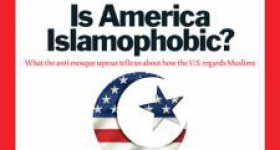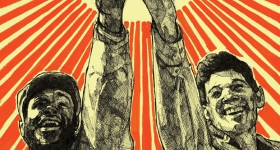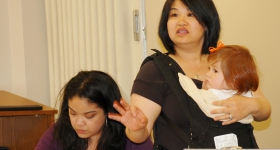Originally posted at New American Media.
NAM Editor’s Note: The newly established Freedom From Fear Award recognizes people who put aside their fear of immigration laws and made a significant impact on immigrants and refugees. This is the second of six articles profiling some of the awardees. For a complete list of winners, visit the award's website.
The night before he announced he was undocumented on the steps of Los Angeles City Hall, Freedom from Fear Award winner David Cho wrote a farewell letter to his friends and family in case he was deported once it became known that he didn’t have the papers to live legally in the United
States. “I didn’t know what would happen to me,” said the 21-year-old.
After his announcement, he said, this fear was replaced by a feeling of liberation.
The Freedom from Fear Awards, which commemorate the 50th anniversary of the Freedom Rides that mobilized young people to take down segregation in the South, honor 15 ordinary people who stood up for immigrants and refugees at great personal risk. Cho came out as undocumented at a rally for the DREAM Act during his second year at UCLA.
“If I didn’t put a human face to [the issue], change wouldn’t come about,” said Cho.
Cho didn’t know he was undocumented until he asked his parents for his Social Security number when filling out his UCLA application. His father reluctantly told him that the family’s visas had expired after nine years of legal residence in the United States as a result of the family’s sponsor mishandling their renewal application.
Cho did not tell anyone when he first found out about his immigration status. At the time, he had never heard of an undocumented Asian student speaking out on immigration.
At UCLA, he eventually joined the student group IDEAS (Improving Dreams, Equality, Access, and Success), a support group for undocumented students. As he became more involved, he decided that he had to come out.
Cho’s family came to the United States from South Korea, pushed out by the Asian financial crisis of the late 1990s. As an elementary school student in South Pasadena, Cho struggled to learn English. Nonetheless, Cho mastered the language and graduated from high school with a 3.9 GPA.
Cho worked 30 hours a week as an SAT tutor in order to pay his college tuition, as he was not eligible for financial aid as an undocumented person. He maintained a 3.6 GPA while working and also serving as the first Korean American and first known undocumented drum major for the UCLA marching band.
He has continued his activist work since coming out as undocumented. He founded a new branch of the IDEAS group called ASPIRE (Asian Students Promoting Immigrant Rights through Education). Since the group’s founding, four more Asian American students at UCLA have publicly come out as undocumented.
Forty percent of undocumented UC students are of Asian descent, according to the Asian Pacific American Legal Center of California. The Korea Times reports that there were approximately 170,000 undocumented Korean Americans living in the United States as of 2010. Yet too often, Cho says, the immigration issue is portrayed solely as a Latino issue -- both in Asian American and mainstream media.
"There's pressure to showcase the good things in the [Asian American] community, and hide the bad," Cho said.
Cho said that José Antonio Vargas, the Filipino American Pulitzer-prize winning journalist who recently announced that he was undocumented, has brought much needed attention to the issue of undocumented Asian Americans.
“We need to improve on engaging the Korean American and Asian American communities to support students in coming out [as undocumented],” he said.
A staunch supporter of the DREAM Act, the federal bill that would provide a path to legalization for qualifying high school graduates enrolled in college or the military, he thinks the legislation is just the tip of the iceberg. “We should take it as a down payment for further reform,” he said, adding that he supports comprehensive immigration reform.
Undocumented students, he said, are “a huge asset to this country.” Cho praised the US Senate for holding its first hearings the DREAM Act last week but remained cautious about what the outcome of the hearings might be. “While we’re hopeful, we’re also realistic,” he said.
Cho graduated from UCLA with a degree in international economics and Korean this spring, and will return in the fall to pursue a Master’s degree in public policy. His goal is to become a US Senator.
The first Freedom from Fear Awards honors “ordinary people who have committed extraordinary acts of courage on behalf of immigrants and refugees -- individuals who have taken a risk, set an example, and inspired others to awareness or action.” The Freedom from Fear Award was created by philanthropic leaders Geri Mannion and Taryn Higashi, and administered and produced by Public Interest Projects.









Comments